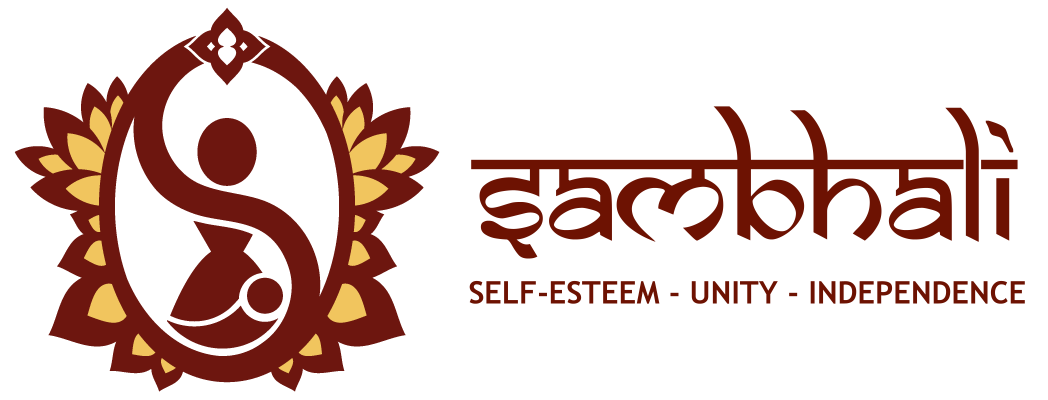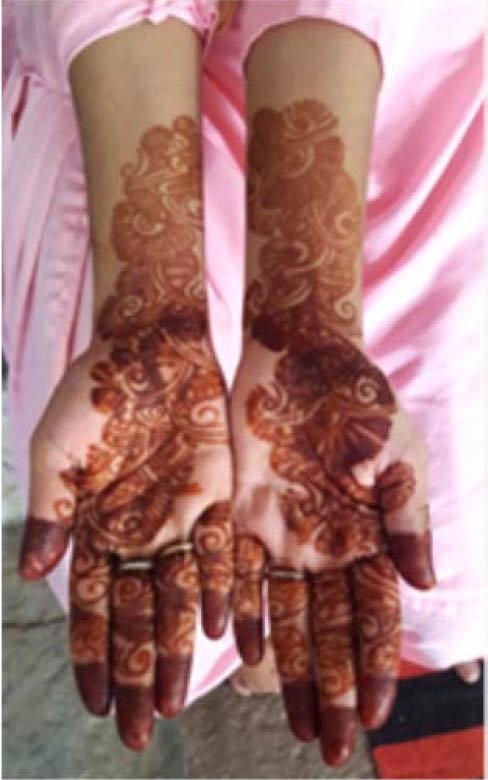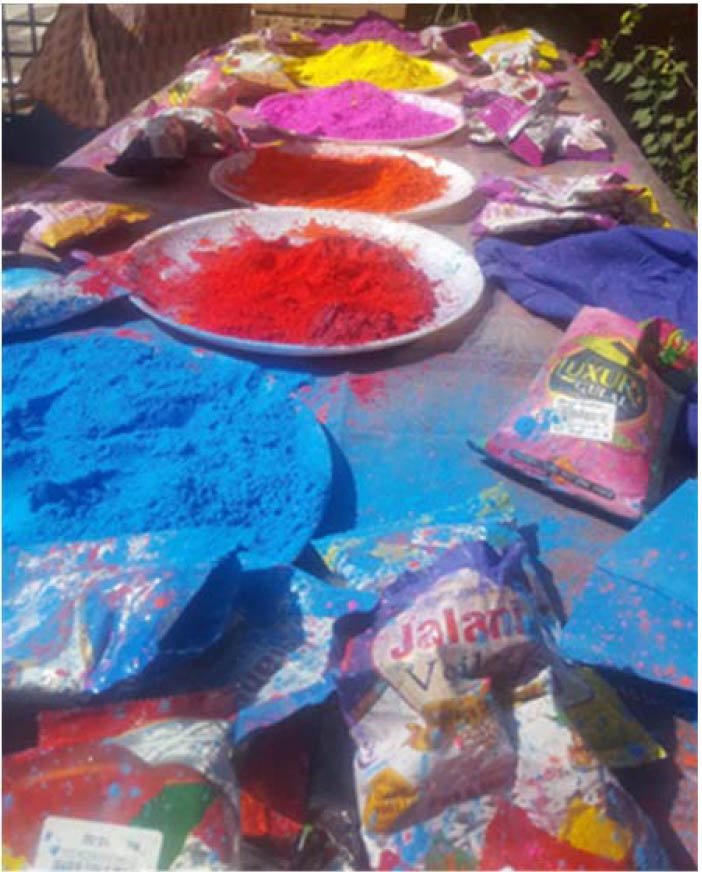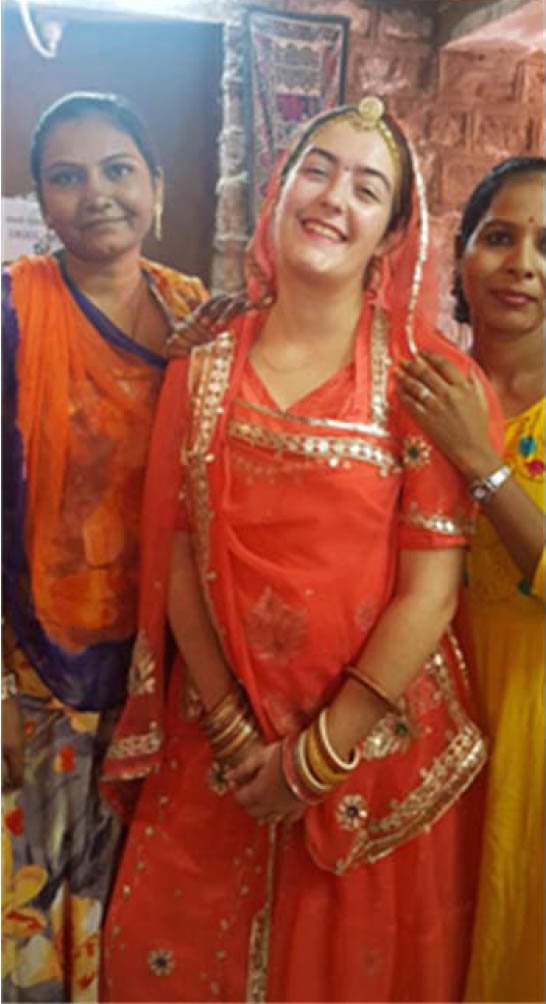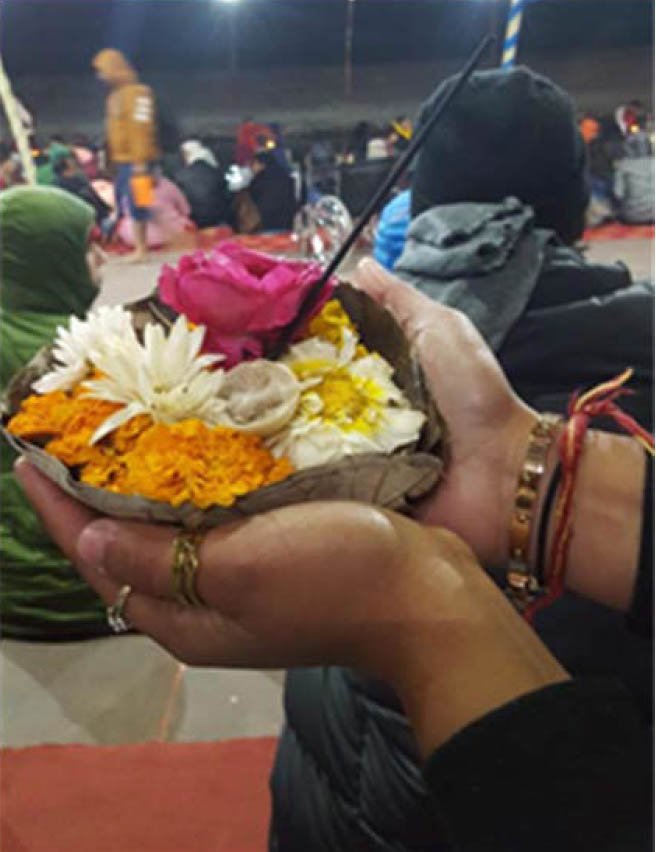Julia Bourget
Country: France
Volunteering period: October 2019- May 2020
8 months
More than a year ago, I made the huge decision to engage in a 12‐month‐long volunteering
mission in the state of Rajasthan, India. I decided to leave France to experience a change of scenery, to learn and discover new things with the locals and to live an emotional experience. In India, I found all this, but also so much more: an outstanding sense of mutual help and solidarity between volunteers and a wonderful sense of family and community everywhere around me.
Volunteering for Sambhali Trust
Throughout my whole stay in Jodhpur, I was working at the Laadli Centre. There, I was teaching basic English and Math to children, teenagers and mothers.
Although it has been hard at times to feel comfortable in my teaching, probably because I was roughly the same age as some of them, those women have welcomed me like one of their own.
The solidarity between them all is surely what struck me the most and what made me question the competitive relationships we sometimes have with each other as women of the West.
All Sambhali centers have the same schedule: mornings are for adults and teenagers and afternoons are for children.
This has allowed me to realize how different it is to teach children compared to adults. The bonding experience is not the same either: those little girls loved me and my work partner unconditionally as soon as we walked through the door on the first day.
The children would forgave any mistake we made. That is what made us feel like we had more freedom to try new things and to vary from the very passive traditional Indian way of teaching. Instead of making them copy from the whiteboard, we tried more interactive exercises that were a lot more fun for the students.
The end result: when I left, some of my “medium” students almost knew how to read!
Laadli Centre's golden trio
The people who enabled me to blossom in my
volunteering experience and to come to work every day with a smile on my face, even at times when I didn’t know where to
start.
Iémima, my partner from the Service Civique program, has been a constant shoulder I could lean on. We were incredibly lucky to agree on our teaching, and to get along at work and in our life outside of work. Working with a French partner really helped me, it made communicating much easier and I felt comfortable right away. Living abroad is of course an opportunity to meet people from all cultures but we shouldn’t feel guilty to find comfort in hanging out with people from back home!
Anju is part of the NGO’s staff: a fortysomethingmother of two boys who has been like a second mom to us. She took care of us for months and even called me once I was back in France to make sure I was okay. She is one of the kindest and genuinely most upright persons I have ever met. Her help was essential to break the language barrier with our students and to understand their culture. In exchange, we taught her to show the wacky side of her personality a bit more, something that is definitely not encouraged amongst Indian women.
I would say that the biggest challenge of this whole experience has been to harmonize the vision that I had of my own work and the expectations that the Indian staff would place on me as a foreign volunteer.
After having discussed with other volunteers around me, I realized that a lot of us shared the same impression: our Indian colleagues were expecting a lot from us. By saying this, I don’t mean that they were pressuring us, it was quite the contrary: all teachers had so much patience and kindness with us. I just mean that our colleagues assumed, probably because of the idealized vision of the West they have, that we knew everything.
The thing is we don’t and as far as I am concerned, I’m not a trained teacher nor from an English‐ speaking background. This sometimes ended up in us being very hard on ourselves and a bit discouraged. Because, let’s be honest, it is far from easy to teach English to people with whom we don’t have any common language and whose cultural codes we don’t always understand.
From another perspective, this taught us a lot about our limits, how to surpass ourselves and the necessity to communicate on our insecurities and frustrations. I’m coming out of this experience convinced of one thing: as Indians often say, “nothing is ever impossible”!
Towards the end of my mission I, with a heavy heart, distanced myself a bit from my dear Laadli Centre to dedicate myself to a different kind of work I was looking forward to doing. I started handling Sambhali Trust’s social media platforms and the international image of the NGO. This experience has been fascinating. I learnt a lot on marketing by collaborating with another volunteer who works in this field back in France. This also allowed me to vary my missions and to get a different perspective on the NGO by working everyday amongst the members of its office, a world that I was very unfamiliar with. Throughout my whole volunteering experience, I have also been writing Sambhali’s monthly newsletter which satisfied my love of writing. I am immensely proud and grateful that I was trusted to carry out these missions.
Diving in and learning from the Indian culture
If there is one thing that warmed my heart when discovering India, it is finding out that Indians are not jealous of their culture and traditions at all! They happily give loads of explanation when, attending one of many religious celebrations, we get confused between Vishnu, Krishna and Ganesh. I got invited multiple times to step inside Hindu temples, to take part in holy rituals and to get my hands tattooed with the well‐known henna paste.
On these pictures, you can see times where I was able to discover the Indian culture and appreciate its great treasures: the famous Holi festival, the most joyful but also the most dangerous event for everybody’s respiratory tracts, or the Dusshera festival where I transformed into a true Rajasthani and did the Dandiya Ras, a traditional dance performed with two wooden sticks.
As with everything that makes them who they are, Indians celebrate the concepts of family and community through these festivals.
Even though it makes me sad that differing from the norm of the group and being true to oneself is generally looked down upon in India, I greatly appreciate how you can never be alone there.
It made me question our hyperindividualistic habits in the West. Humankind still has to find the way to a fair balance.
This last picture was taken during a fire ritual on one of Rishikesh’s ghats, the city of a thousand ashrams made famous by the Beatles in the 1970’s. A few of my volunteer friends and I spent several days there during our Christmas break. In between a rafting session in the freezing cold river Ganges and a trek in the Himalayas seeking for beautiful waterfalls and the greatest sunset of all, we witnessed this ceremony honoring the goddess of the Ganges, the river giving life to the whole country.
We placed our offering of flowers and incense on the water stream, after holding in our hands the ritual plate full of flames! This moment was full of emotions and we will remember it as a sharing experience: locals were not looking at us in a funny way because we were taking part in one of their sacred rituals, they were getting us even more involved!
Living in Jodhpur
The majority of Sambhali’s activities take place in the city of Jodhpur, nicknamed the “blue city”. It is situated next to the Thar Desert, around 600 kilometers from the border between India and Pakistan. This place is full of history, with its beautiful fort, remains of the maharajas’ reign. A must‐see! I took this view of the city centre from the top of the fort: buildings covered in blue paint to protect the people from the desert’s heat. Contrary to more modern cities like the capital Delhi, experiencing Jodhpur’s city centre provides a true immersion in the tra‐ditional Indian culture: everywhere you look, you will see women walking around in their colorful sarees.
Jodhpur has been a good compromise for me: I couldn’t have spent that much time in a city as full of people, noise and pollution as Delhi, but I still appreciated to be somewhere I could go to restaurants, shops and bars. Some of our volunteers have spent a portion of their mission teaching in Setrawa’s public schools, a desert situated two and a half hours from Jodhpur. There you can find sand, sand stones houses and that is it! But you can enjoy the greatest peacefulness and silence, two things that I missed a lot living in Jodhpur. It is no legend that India is loud and dirty! Although I got used to it fairly quickly, I would be lying if I said it wasn’t completely exhausting in the long run.
Except for these disadvantages, life is good in Jodhpur. The city centre won my heart right away with its chai and samosa stalls, textile and perfume shops and many other things. I created my own routine in the famous Sardar Market, with good addresses recommended by former volunteers at Sambhali. Even months after I arrived in Jodhpur, I still had the same joy walking around these blue streets, narrow and quite decrepit. And if you get bored of this traditional loveliness, there are still some modern neighbourhoods. But how could you get bored, with the never‐ending list of rooftops to visit? Two things to prepare yourself to experience though: being constantly stared at and firmly bargaining with the autorickshaw drivers!
Living in a community of volunteers
It may seem curious to go thousands of kilometers away from home to form friendships with people that have lived their whole lives only a few minutes away from us. But I will never be able to express how grateful I am for the warm welcome, the company, and the support I got from all the volunteers I worked with for 8 months. Because of the length of my mission, way longer than that of most people working for Sambhali, I have seen a lot of people coming and going. Somehow, I became volunteers’ reference, the one people would turn to when they wanted advice about the city or the job with the NGO. Having this role has been my greatest pleasure and pride. In return, they allowed me to keep my head up during tough times, when I was feeling homesick. Everything started with three friends wanting to go on an adventure in India,and ended up with a true family gathered around Léana, Maigane and I (both French Service Civic volunteers too).
My all‐time partner was of course Iémima. Her early departure after only 6 months of volunteering broke my heart, even though I was quite used to saying goodbye to volunteers. We did everything together: teaching, exploring, laughing and crying. I cannot wait to go on a new adventure with her.
Unfortunately, my experience was shortened, but I was lucky enough to come home with two of my French mates, Louise and Pauline. Sharing this chaotic journey back home with great people was certainly necessary!
